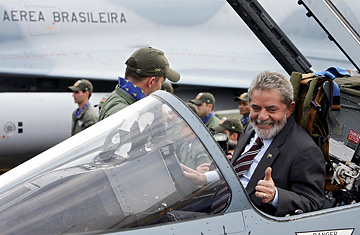
Brazilian President Luiz Inacio Lula da Silva inside the cockpit of Brazil's Air Force Mirage 2000-C aircraft at the Anapolis Air Base.
First it was Venezuela, spending $4 billion on Russian fighter planes, Kalashnikovs and perhaps even submarines. Then it was Brazil, in August announcing a 53% increase in its military budget for 2008, the biggest such increase in more than a decade. The competition is still in the early stages but when two of Latin America's nouveau riche oil powers start splashing out on weapons, alarm bells ring over an arms race.
Indeed, Chavez's spending spree has given Brazil's long-dormant arms industry a bit of a political kick-start. Says Brazilian Senator Jose Sarney, a regular critic of Venezuela's president: "Hugo Chavez's armed forces have ordered 100,000 Kalashnikov rifles, 50 attack and transport helicopters, smart bombs, 24 Sukhoi Su-30 fighter planes. There is also talk of them buying nine submarines from Russia for $3 billion. It's very worrying. As Venezuela turns itself into a major military power, it obliges the other nations in South America to increase the power of their own forces. [An arms race] sadly seems to be getting under way."
Not that Brazil and Venezuela have territory to fight over. Venezuela's border beefs are with its other neighbors, Colombia (over gas-rich waters) and Guyana (over areas west of the Essequibo river). He is unlikely to use arms to solve those disputes, either. His army is not as battle hardened as Colombia's — which has been fighting a prolonged civil war; and any intervention against Guyana is likely to draw in the U.S. and Guyana's former colonial ruler, Britain.
What the military build-up does, however, is give Chavez's Venezuela added prestige in the continental battle for political supremacy. Chavez has brought together South America's radical leftists under his socialist banner; while Brazil's President Luiz Inacio Lula da Silva leads a more measured coalition of social democrats. The two men are friends but both countries are getting used to being at the political and economic vanguard of South America. Military strength helps with that.
Brazil's past obsession was potential conflict with its southern neighbor, Argentina. That has passed into history. Venezuela's military spending, however, has forced Brazil to realize that its security needs have shifted. It must now protect its jungle frontiers in the north and west from the depredations of drug smugglers. And it must also police the territorial waters that are home to regular new finds of oil and gas. The forces it needs to do that have suffered from neglect and disrepair. A recent editorial in the newspaper O Estado de Sao Paulo said that almost two-thirds of the air force's planes and half of the navy's ships are unfit for their intended use.
Lula has asked Brazil's Congress to allocate 10.13 billion reais for its 2008 military budget, or around $5.6 billion at the current exchange rate. Brazil has what it calls a "dissuasive" defense policy and the majority of its spending will go to non-aggressive weaponry such as transport planes, helicopters, communications equipment and armored vehicles, according to Defense Ministry officials and analysts. Around $70 million has been set aside for early work on a nuclear submarine.
"There are very real security concerns that are being neglected," says Martin Joyce, the South America defense analyst for Jane's. "One is the Amazon region where drug traffickers are operating with impunity. Secondly, we are also seeing an increased presence of Colombian guerrillas and that requires mobility and that is whey we see helicopters and military airlift high on the priority list. Then there is the new oil reserves and part of the reason for the procurement of a nuclear submarine is because they said they need to protect those resources."
"Venezuela," says Joyce, "comes fairly low down the list." But Chavez does give a face to the race and an impetus for nationalistic Brazilian politicians to vote for an increase in the military budget. Indeed, part of the proposed new funds will go toward resuscitating the country's dormant arms industry. "We had 1% [share] of the world's arms market in the 1970s and 1980s," says Reserve Colonel Geraldo Lesbat Cavagnari, coordinator of the Strategic Studies Group at Unicamp university. "We need to recuperate that industry and invest in it. That means producing for the Brazilian armed forces."
Military powers controlled seven of South America's 10 countries as recently as 1980 but even then cross-border conflict was rare. Everyone would like it to stay that way. A regional arms race is hardly the best way to keep the peace.
